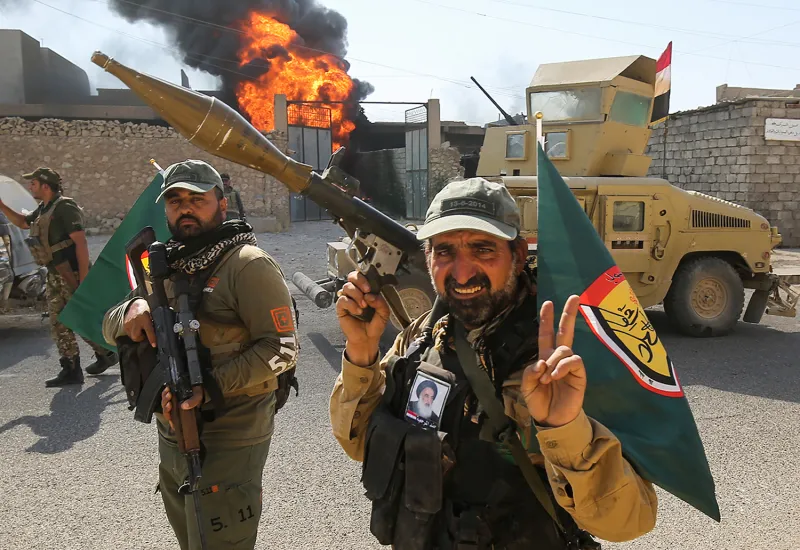Several of Iraq’s most powerful Iranian-backed militias are now preparing to lay down their arms for the first time in nearly two decades—not out of reconciliation, but out of fear.
Faced with the threat of direct U.S. military retaliation under the Trump administration, the commanders of key Shiite militia groups say they are ready to dismantle their armed networks, multiple senior Iraqi officials and militia leaders told Reuters. These groups, once considered untouchable power brokers, now appear shaken by the specter of American airstrikes and rising regional instability.
The decision follows private ultimatums from U.S. officials warning Baghdad: disband the militias—or Washington will do it by force. The U.S. State Department reinforced the message bluntly: “These forces must respond to Iraq’s commander-in-chief, not to Iran.”
The factions involved—including Kataeb Hezbollah, al-Nujaba, Kata’ib Sayyid al-Shuhada, and Ansar Allah al-Awfiya—make up the core of the Islamic Resistance in Iraq, a heavily armed coalition of hardline Shiite militias loyal not to Baghdad, but to Iran’s Islamic Revolutionary Guard Corps (IRGC). These groups have claimed responsibility for dozens of missile and drone attacks on U.S. and Israeli targets since Hamas launched its October 7 massacre against Israel in 2023, a war that plunged the entire region into chaos.
Iran’s once-expansive Axis of Resistance, built over decades through proxy forces across the Middle East, is now under unprecedented strain. In the wake of Israel’s punishing campaign in Gaza, Hezbollah is hemorrhaging resources in Lebanon, and the Houthis in Yemen have come under relentless U.S. bombardment. Meanwhile, Syria’s Assad regime is no more, and now even Iraq’s militias—long shielded by Tehran—appear ready to retreat.
According to Iraqi officials, IRGC leadership has given these militias the green light to make “whatever decision is needed” to avoid further confrontation with Washington.
“The factions are not acting stubbornly,” said Izzat al-Shahbndar, a senior Iraqi Shiite politician. “They are fully aware that they could be targeted by the U.S.”
Iraqi Prime Minister Mohammed Shia al-Sudani is now at the center of high-stakes negotiations with militia leaders over how to dismantle or repurpose the groups. Options on the table include integrating fighters into the national army or transitioning them into political organizations.
U.S. Secretary of Defense Pete Hegseth reportedly warned Sudani directly during a March 16 call: rein in the militias, or risk retaliation. American officials say the stakes are higher than ever, as the groups have launched lethal attacks on both U.S. and Israeli forces, including the deadly drone strike in Jordan that killed three U.S. soldiers and a drone attack in Israel that killed two IDF troops and injured 24.
And the pressure extends beyond Iraq’s borders. The U.S. has allegedly warned of political and economic consequences if Iraq fails to secure the release of Elizabeth Tsurkov, a Russian-Israeli academic kidnapped over a year ago and believed to be held by Kataeb Hezbollah.
Whether this unprecedented shift by the militias represents a genuine move toward peace or merely a tactical pause is unclear. A U.S. official, speaking anonymously, cautioned that the militias have temporarily ceased operations under pressure in the past—only to return stronger.
(YWN World Headquarters – NYC)











